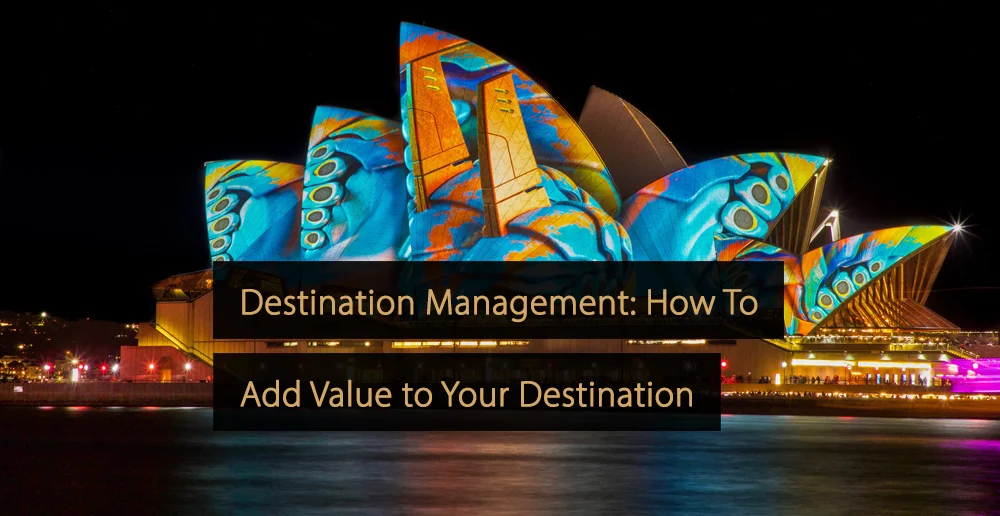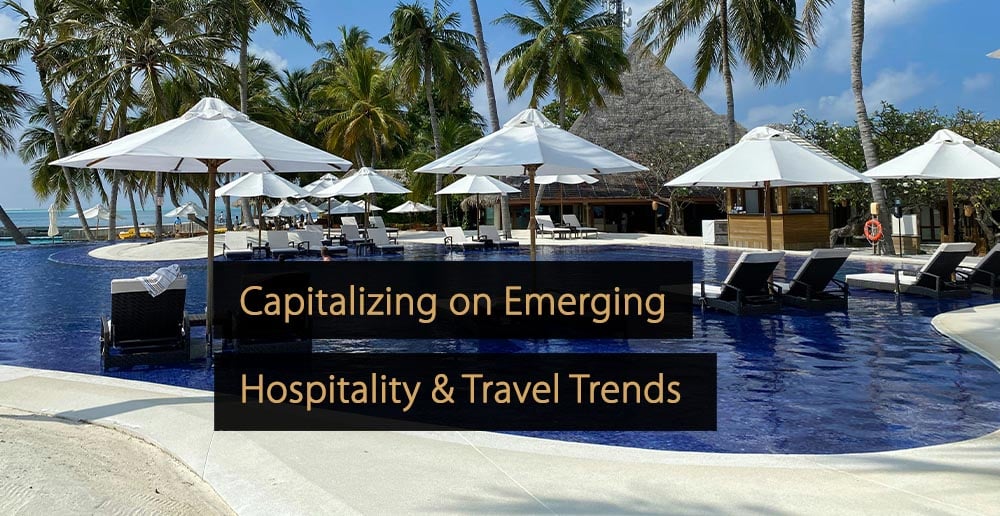Destination management can play a vital role in helping unlock the many benefits associated with tourism while ensuring that your destination delivers something unique for travelers. In this article, you will learn more about destination management and how it can help ensure tourism adds value to your destination.
Table of Contents:
- What is Destination Management?
- Why is Destination Management Important?
- How to Execute Destination Management
- What is a Destination Marketing Organization?
- How Can a DMO Help With Destination Management?
- Destination Marketing Strategies
What is Destination Management?
Destination management is a coordinated process, where almost all aspects of a destination are managed, including marketing efforts, local resources, accommodation, activities, events, environmental concerns, tourist attractions, and transportation. It is usually the responsibility of a destination management company (DMC).
They adopt a holistic approach to managing tourism for their destination and may offer additional services, like training. Destination management companies tend to be membership-based, and their members and stakeholders may include governments, community leaders, local businesses, charities, and others involved with travel and tourism.
Why is Destination Management Important?
Generally speaking, tourism can be extremely beneficial for an area or destination, bringing more money into the local economy, helping to attract investment from businesses, and allowing existing businesses in the area to thrive. It can help to enrich and revitalize villages, towns, cities, resorts, regions, and countries.
That said, tourism can bring downsides, such as damage to landscapes, extra pollution, more use of resources, and traffic congestion. Therefore, tourism management is essential, weighing pros and cons, looking out for businesses and local residents, protecting the environment, and balancing supply and demand.
Simply put, destination management involves taking the necessary steps to ensure tourism adds value to a destination.
How to Execute Destination Management
In terms of actually implementing a destination management plan, it is recommended to break your strategy down into four key steps, which can be defined as follows:
1. Place – What is the Destination?
When considering the place issue, you need to consider your destination, how it can be defined, and whether it requires destination management. In many cases, the destination is obvious: a city, a state, an island, or even a whole country. However, it could equally be defined by a mountain range or a coastline.
One destination may be situated within another, which can confuse matters. The Great Barrier Reef is considered a destination, but so is the state of Queensland, and the town of Port Douglas, which both offer access to it. Why are you defining your destination as you are? Why does it make sense to manage it collectively?
2. People – Who Are the Visitors and Key Partners?
As you think about people, you should ponder who visits your destination and their motivation. It may appeal to several different demographics, for different reasons, or it might primarily appeal for a single reason. Where are visitors coming from? What are they seeking? Are they families, groups, or individuals?
You also need to consider who makes up the local community, their priorities, and who the key stakeholders and partners from the travel industry are. These potential destination management partners may include local businesses, transport service providers, activity centers, tour operators, and more.
3. Product – What Is On Offer?
Next, you need to be clear on what the destination offers tourists and other travelers. What are they buying? What will their experience be? What can you promise people through your marketing efforts? Accommodation, activities, attractions, and transportation methods can all fall under the product umbrella.
Does your destination have the ability to provide tourists with a memorable or unique experience? Is your destination delivering this for people right now? If not, why not? You need to consider where tourists will likely spend their time and money, and what their decisions mean for the area.
4. Process – Destination Management in Action
Finally, when considering your process, you must consider how you can ensure the product and experience you offer to connect with the people traveling to your destination. It means identifying precisely what needs to be done to manage the destination properly, for optimal results.
This step must be done last because it requires understanding the other components. You need to know how the place is defined, who the people involved will be, and what the product is. Then you can start to think about the effects of tourism on your destination, where improvements are needed, and so on.
The section “How to Execute Destination Management” summarizes “The guide to best practice destination management” by The Australian Regional Tourism Network. Click here to download the full report (downloads automatically)
What is a Destination Marketing Organization?
A destination marketing organization (DMO) is an organization that is expressly concerned with promoting a destination to tourists, businesses, investors, and others. In many ways, DMOs and DMCs are similar, in that they are made up of several stakeholders who all have a vested interest in the destination successfully appealing to travelers.
The main purpose of a destination marketing organization is to create a broader marketing strategy, which helps to set your destination apart from the main alternatives. This may involve, for example, identifying unique selling points and highlighting them, advertising online and offline, collaborating with influencers, and branding the destination.
How Can a DMO Help With Destination Management?
A key part of destination management involves getting the most out of the local tourism industry. A destination marketing organization can assist with this by increasing demand to travel to your destination in the first place. This is achieved by creating a comprehensive destination marketing strategy.
In addition to promoting the destination, a DMO can provide potential travelers with valuable information, direct travelers to hotels and other forms of accommodation, provide access to booking platforms, and help tourists to plan their itinerary. They can also work with a DMC, to promote the right aspects of the destination, at the right time, to the right demographic, to ensure tourists add value to your destination.
Destination Marketing Strategies
Destination marketing goes hand-in-hand with a destination management strategy, highlighting to potential travelers the unique selling points and experiences your destination offers them.
In the article “Destination Marketing Strategies to Attract More Visitors”, you will learn more about destination marketing. You will also find useful advice on some of the most effective techniques that can be used, to generate increased interest and encourage more visitors to travel to your destination.
Destination management can go a long way toward ensuring tourism adds value to a destination. By focusing on the ideas of place, people, product, and process, it becomes easier to consider the interests of all stakeholders, adopt a holistic approach, promote your destination, and develop a coherent management strategy.
Want to Learn More About Management in Related Industries?
All hospitality, travel, and tourism-related industries have commonalities, however, specific unique factors influence management in each industry. You can learn more about management within related industries in the following articles.
- Hotel Management: Everything You Need to Know About Managing a Hotel
- Hospitality Management: The Essentials About Hospitality
- Tourism Management: All You Need to Know About Tourism
- Revenue Management; clearly explained!
- Restaurant Management: Everything You Need to Know
- What is Travel Management?
- Aviation Management: A Great Guide to Start Your Career in Aviation
More Tips to Grow Your Business
Revfine.com is the leading knowledge platform for the hospitality and travel industry. Professionals use our insights, strategies, and actionable tips to get inspired, optimize revenue, innovate processes, and improve customer experience.Explore expert advice on management, marketing, revenue management, operations, software, and technology in our dedicated Hotel, Hospitality, and Travel & Tourism categories.
This article is written by:
Hi, I am Martijn Barten, founder of Revfine.com. With 20 years of experience in the hospitality industry, I specialize in optimizing revenue by combining revenue management with marketing strategies. I have successfully developed, implemented, and managed revenue management and marketing strategies for individual properties and multi-property portfolios.









It’s good that you highlighted how vital tourism is for an area to bring in more money to its local economy, which is why destination management is beneficial since it helps add value to a destination as a tourist location. It directly benefits local businesses and indirectly stimulates local employment.
Thank you very much, this article taught me a lot!